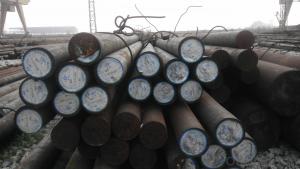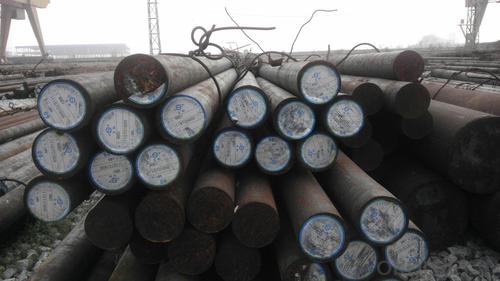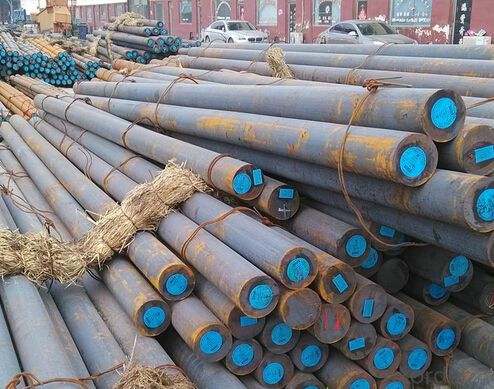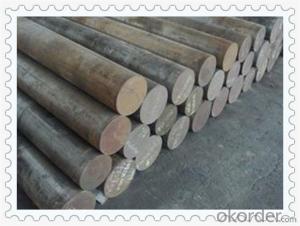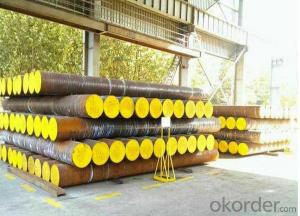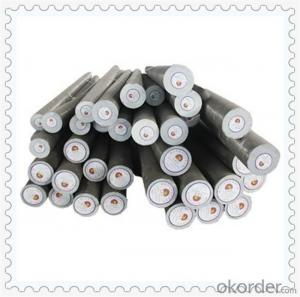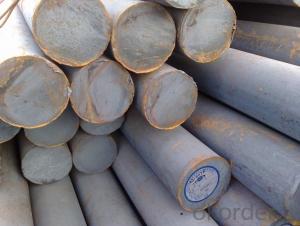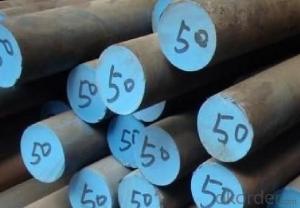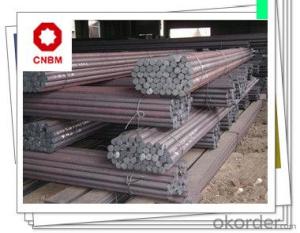Special Steel Hot Rolled SCM440 Material Round Bar
- Loading Port:
- China main port
- Payment Terms:
- TT OR LC
- Min Order Qty:
- 30 m.t.
- Supply Capability:
- 10000 m.t./month
OKorder Service Pledge
OKorder Financial Service
You Might Also Like
Specification
Chemical Element for JIS SCM440 round alloy steel bar
| Standard | Grade Number | |||||||||
| GB | 42CrMo | C | Si | Mn | P | S | Cr | Ni | Mo | Cu |
| ASTM | 4140 | 0.36-0.44 | 0.10-0.40 | 0.65-1.10 | ≤0.04 | ≤0.04 | 0.75-1.20 | - | 0.15-0.35 | ≤0.030 |
| DIN | 42CrMo4 1.7225 | 0.35-0.44 | 0.15-0.30 | 0.70-0.90 | ≤0.035 | ≤0.04 | 0.80-1.10 | - | 0.15-0.25 | ≤0.025 |
| JIS | SCM440 | 0.38-0.42 | 0.15-0.35 | 0.60-0.85 | ≤0.03 | ≤0.03 | 0.9-1.20 | ≤0.25 | 0.15-0.30 | ≤0.30 |
Physical Properties for JIS SCM440 round alloy steel bar
| Physical Properties | |||
| Tensile Strength (MPa) | ≥1080(110) | ||
| Yield strength(MPa) | ≥930(95) | ||
| Elongation(%) | ≥12 | ||
| Reduction of area(%) | ≥45 | ||
| Akv (J) | ≥63 | ||
| Impact roughness(J/cm2) | ≥78(8) | ||
| Hardness | ≤217HB | ||
| Specimen size | 25mm | ||
Surface Treatment: painting,plating,polishing,black oxide,transparent anti-rust oil
Heat treatment: Normalized / Annealed / Quenched / tempered
Product show
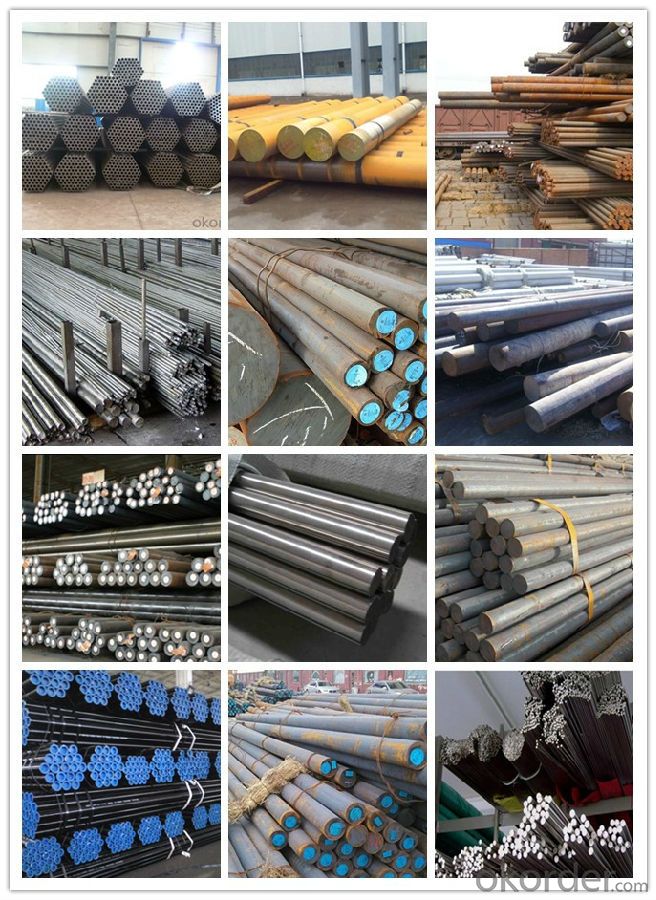
Workshop show
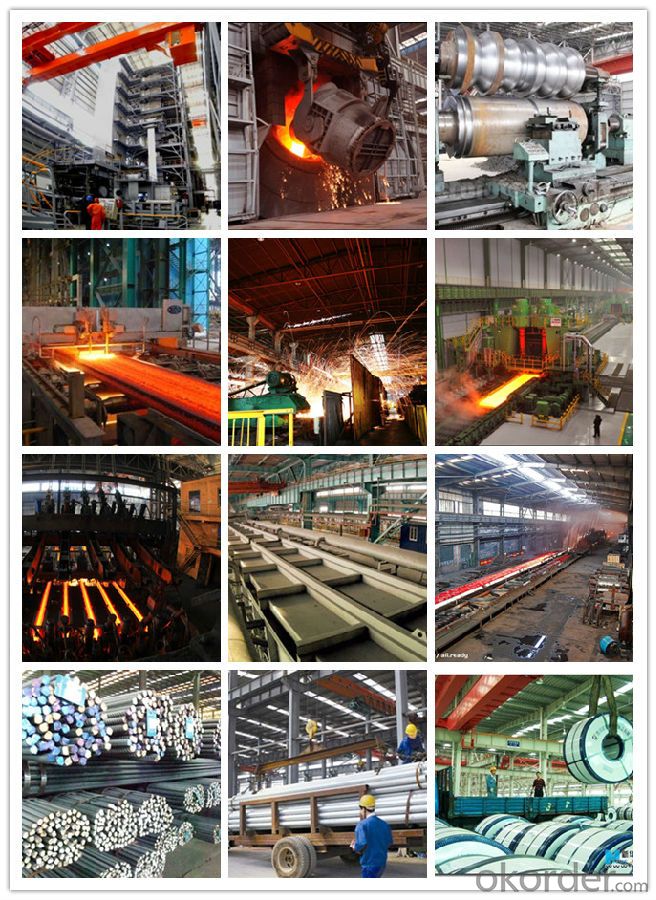
Shipping
1. FedEx/DHL/UPS/TNT for samples, Door-to-Door;
2. By Air or by Sea for batch goods, for FCL; Airport/ Port receiving;
3. Customers specifying freight forwarders or negotiable shipping methods!
Delivery Time: 3-7 days for samples; 5-25 days for batch goods.
Payment Terms
1.Payment: T/T, L/C, Western Union, MoneyGram,PayPal; 30% deposits; 70% balance before delivery.
2.MOQ: 1pcs
3.Warranty : 3 years
4.Package Informations: 1) EXPORT, In 20 feet (GW 25 ton) or 40 feet Container (GW 25 ton)
2)as customer's requirement
Main Product
Plastic Mould Steel
DIN 1.2311,1.2738,1.2083,1.2316 etc.
AISI P20,P20+Ni,420 etc.
JIS SUS420J2
Hot Work Steel
DIN 1.2344,1.2343,1.2367,1.2365,1.2581,1.2713 etc.
AISI H13,H11,H10,H21, etc.
JIS SKD61,SKD6,SKD5,SKT4 etc.
Cold Work Steel
DIN 1.2739, 1.2601, 1.2080, 1.2436, 1.2631, 1.263, 1.2510, 1.2327 etc.
AISI D2, D5, D3, D6, A8, A2, O1 etc.
JIS SKD10, SKD11, SKD1, SKS3 etc.
High Speed Steel
DIN 1.3343, 1.3243, 1.3247, 1.3355 etc.
AISI M2, M35, M42, T1 etc.
JIS SKH51, SKH35, SKH59, SKH2 etc.
Alloy Structural Steel
DIN 1.7035,1.6511,1.7220,1.7225 etc.
AISI 5140, 4340, 4135, 4140 etc.
JIS SCr440,SNCM439,SCM435,SCM440 etc.
Stainless & Carbon Steel or Others
DIN 1.4125,1.1191 etc
AISI 440C,1045, 1020 etc.
JIS SUS440C,S45C etc
Why choose us?
(1) The leading exporter in China special steel industry.
(2) Large stocks for various sizes, fast delivery date.
(3) Good business relationship with China famous factories.
(4) More than 7 years steel exporting experience.
(5) Good after-sales service guarantee.
- Q: How does the composition of special steel affect its mechanical properties?
- The composition of special steel significantly affects its mechanical properties. Various alloying elements such as carbon, manganese, chromium, nickel, and others are added in specific quantities to enhance the steel's strength, hardness, toughness, and corrosion resistance. The presence and ratio of these elements determine the steel's microstructure, which in turn determines its mechanical properties. For example, higher carbon content increases hardness and strength, while manganese improves toughness. Similarly, chromium and nickel increase corrosion resistance and provide better heat resistance. Therefore, the composition of special steel plays a crucial role in defining its mechanical properties.
- Q: Can special steel be used in electrical applications?
- Yes, special steel can be used in electrical applications. Special steel, such as electrical steel or transformer steel, is specifically designed to have low electrical resistance and high magnetic permeability, making it ideal for use in electrical equipment like transformers, motors, and generators.
- Q: What are the different types of special steel coatings?
- Various special steel coatings exist to enhance the properties and performance of steel. Some commonly used types include: 1. Galvanized Coatings: These coatings involve applying a layer of zinc to the steel surface. Galvanized coatings provide excellent corrosion resistance, making them suitable for outdoor applications and structures exposed to harsh environments. 2. Epoxy Coatings: Known for their exceptional durability and chemical resistance, epoxy coatings protect steel from corrosion, abrasion, and chemical exposure. They can be single or multi-layer systems, extending the steel's lifespan and performance. 3. Powder Coatings: Powder coatings, applied electrostatically and cured under heat, offer excellent protection against corrosion, impact, and UV damage. They come in various colors and finishes, making them popular for aesthetic purposes. 4. Thermal Spray Coatings: These coatings involve applying molten particles onto the steel surface using a thermal spray gun. Ceramic coatings are the most common type, providing enhanced wear resistance, thermal insulation, and corrosion protection. 5. PVD Coatings: Physical Vapor Deposition (PVD) coatings deposit thin layers of metallic or ceramic materials onto the steel surface through vaporization. PVD coatings improve hardness, wear resistance, and reduce friction. 6. Organic Coatings: Polyurethane or acrylic coatings, known as organic coatings, protect against corrosion, UV damage, and chemical exposure. They are commonly used in architecture, automotive parts, and industrial equipment. 7. Chrome Plating: Chrome plating involves depositing a layer of chromium onto the steel surface. This coating offers excellent corrosion resistance, hardness, and a decorative finish. It is often used in automotive applications and for decorative purposes. Selecting the appropriate special steel coating is crucial, considering the specific requirements of the steel component or structure, including corrosion resistance, durability, aesthetics, and environmental factors.
- Q: What are the common grades of special steel?
- The common grades of special steel vary depending on the specific application and desired properties. Some of the commonly used grades include: 1. Stainless steel: This is a corrosion-resistant steel alloy that contains a minimum of 10.5% chromium. Grades such as 304, 316, and 410 are commonly used in various industries due to their excellent corrosion resistance, high strength, and good formability. 2. Tool steel: These grades are specifically designed for toolmaking and are known for their high hardness, wear resistance, and toughness. Common tool steel grades include D2, A2, O1, and S7, each having specific properties suitable for different applications. 3. High-speed steel (HSS): HSS is a type of tool steel that can retain its hardness and cutting ability even at high temperatures. It is commonly used in cutting tools such as drills, end mills, and taps. M2, M35, and M42 are some of the common grades of HSS. 4. Alloy steel: As the name suggests, alloy steel is made by adding different alloying elements to enhance specific properties. Grades such as 4140, 4340, and 8620 are commonly used due to their high strength, toughness, and wear resistance. They find applications in industries like automotive, aerospace, and machinery. 5. Spring steel: Spring steel is known for its ability to return to its original shape after being bent or twisted. Grades like 1095 and 5160 are commonly used in the manufacturing of springs, suspension components, and hand tools. These are just a few examples of the common grades of special steel. There are numerous other grades available, each with unique properties and applications. It is important to select the appropriate grade based on the specific requirements of the intended use.
- Q: What are the properties of corrosion-resistant alloy steel?
- Corrosion-resistant alloy steel possesses properties such as high resistance to corrosion, oxidation, and rusting, making it suitable for applications in aggressive environments. It exhibits excellent strength and durability, even in harsh conditions, while maintaining its corrosion resistance. Additionally, it can withstand high temperatures and pressures, making it ideal for industries like oil and gas, chemical processing, and marine applications.
- Q: How does special steel perform at high temperatures?
- Special steel performs well at high temperatures due to its unique composition and properties. It exhibits excellent strength, corrosion resistance, and thermal stability, enabling it to retain its mechanical properties even at elevated temperatures. Additionally, special steel has low thermal expansion, ensuring dimensional stability even under extreme heat. These characteristics make it ideal for applications in industries such as aerospace, oil and gas, and power generation, where high temperatures are commonplace.
- Q: How does hot rolling affect the microstructure of special steel?
- Hot rolling, a metalworking process, involves heating steel above its recrystallization temperature and passing it through rollers to reduce thickness. This process significantly affects the microstructure of special steel. When steel is hot rolled, the high temperature prompts the grains to recrystallize, eliminating defects and creating a more uniform and refined grain structure. This leads to smaller, equiaxed grains, which enhance the steel's mechanical properties. Furthermore, hot rolling encourages the formation of microstructural features like dislocation cells and subgrains. These features increase the steel's strength and toughness, making it suitable for applications requiring high performance and durability. Moreover, hot rolling can cause certain alloying elements to precipitate within the steel. These precipitates play a crucial role in enhancing specific properties such as corrosion resistance or high-temperature strength. Overall, hot rolling profoundly impacts the microstructure of special steel. It refines the grain structure, promotes beneficial microstructural features, and facilitates the precipitation of alloying elements. These changes contribute to improved mechanical properties and performance, making hot rolled steel a preferred choice in industries like automotive, aerospace, and construction.
- Q: Can special steel be used in food processing?
- Food processing can indeed utilize special steel. The food processing industry commonly relies on special steels, like stainless steel, because of their distinct properties that make them suitable for safely handling food. Stainless steel, for example, is frequently chosen due to its resistance to corrosion, which makes it an excellent option for handling acidic or salty foods without the fear of contamination. Moreover, stainless steel is non-reactive, ensuring that no harmful substances are released into the food during processing. Furthermore, stainless steel is easy to clean and maintain, guaranteeing the maintenance of high hygiene standards in food processing facilities. As a result of these qualities, special steels, including stainless steel, find extensive use in the manufacturing of food processing equipment, such as tanks, pipes, and utensils.
- Q: How does the microstructure of special steel affect its performance?
- The microstructure of special steel plays a crucial role in determining its performance. It influences various mechanical properties such as strength, hardness, toughness, and wear resistance. By controlling the arrangement and size of the steel's grains, as well as the presence of any additional phases, manufacturers can tailor the material to meet specific requirements. For instance, a finer grain structure can enhance strength and hardness, while a uniform distribution of carbides can improve wear resistance. Consequently, optimizing the microstructure allows special steel to exhibit superior performance characteristics in specific applications.
- Q: Is special steel suitable for marine applications?
- Marine applications necessitate materials capable of enduring high levels of moisture, exposure to saltwater, and environmental factors such as temperature fluctuations and the impact of waves. Special steel, also known as marine grade stainless steel, is specifically engineered to withstand the challenging conditions prevalent in marine environments. Its exceptional resistance to corrosion, particularly in the presence of saltwater, renders it highly appropriate for diverse marine applications. Distinguished by a greater proportion of chromium and nickel compared to standard steel grades, special steel augments its corrosion resistance properties. Furthermore, it is frequently alloyed with molybdenum, titanium, or other elements to further enhance its resistance to pitting, crevice corrosion, and chloride-induced stress corrosion cracking. Shipbuilding, offshore oil and gas platforms, marine equipment and machinery, marine pipelines, as well as marine architecture and structures are among the common marine applications that derive benefits from special steel. Additionally, special steel is employed in the construction of naval vessels, submarines, and offshore wind farms. To summarize, special steel is exceptionally well-suited to marine applications due to its exceptional resistance to corrosion, durability, and strength. It effectively withstands the rigorous conditions present in marine environments, ensuring the longevity and dependability of marine structures and equipment.
Send your message to us
Special Steel Hot Rolled SCM440 Material Round Bar
- Loading Port:
- China main port
- Payment Terms:
- TT OR LC
- Min Order Qty:
- 30 m.t.
- Supply Capability:
- 10000 m.t./month
OKorder Service Pledge
OKorder Financial Service
Similar products
Hot products
Hot Searches
Related keywords
